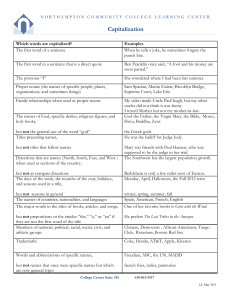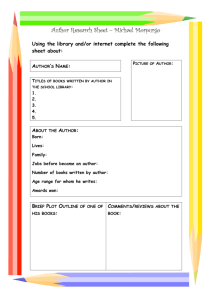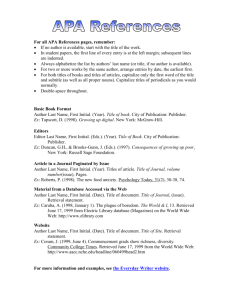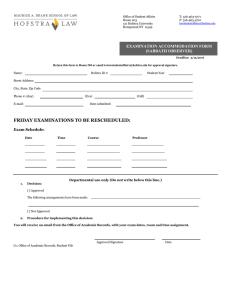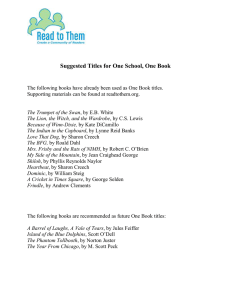Editorial Style Guidelines: Frequently Occurring Issues
advertisement
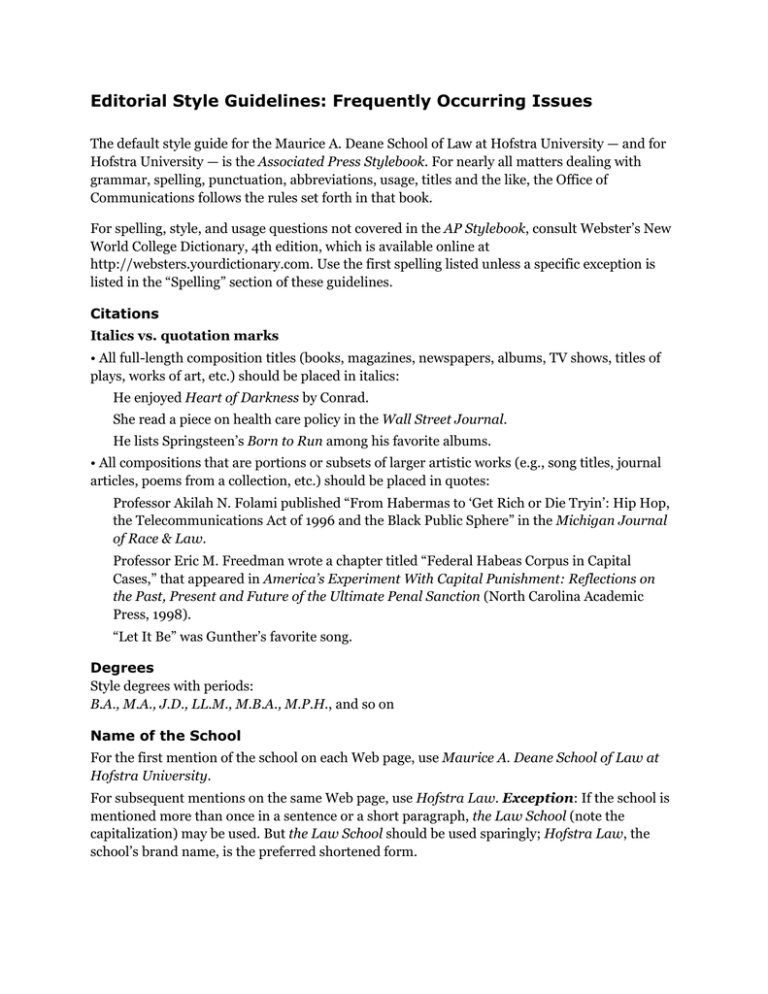
Editorial Style Guidelines: Frequently Occurring Issues The default style guide for the Maurice A. Deane School of Law at Hofstra University — and for Hofstra University — is the Associated Press Stylebook. For nearly all matters dealing with grammar, spelling, punctuation, abbreviations, usage, titles and the like, the Office of Communications follows the rules set forth in that book. For spelling, style, and usage questions not covered in the AP Stylebook, consult Webster’s New World College Dictionary, 4th edition, which is available online at http://websters.yourdictionary.com. Use the first spelling listed unless a specific exception is listed in the “Spelling” section of these guidelines. Citations Italics vs. quotation marks • All full-length composition titles (books, magazines, newspapers, albums, TV shows, titles of plays, works of art, etc.) should be placed in italics: He enjoyed Heart of Darkness by Conrad. She read a piece on health care policy in the Wall Street Journal. He lists Springsteen’s Born to Run among his favorite albums. • All compositions that are portions or subsets of larger artistic works (e.g., song titles, journal articles, poems from a collection, etc.) should be placed in quotes: Professor Akilah N. Folami published “From Habermas to ‘Get Rich or Die Tryin’: Hip Hop, the Telecommunications Act of 1996 and the Black Public Sphere” in the Michigan Journal of Race & Law. Professor Eric M. Freedman wrote a chapter titled “Federal Habeas Corpus in Capital Cases,” that appeared in America’s Experiment With Capital Punishment: Reflections on the Past, Present and Future of the Ultimate Penal Sanction (North Carolina Academic Press, 1998). “Let It Be” was Gunther’s favorite song. Degrees Style degrees with periods: B.A., M.A., J.D., LL.M., M.B.A., M.P.H., and so on Name of the School For the first mention of the school on each Web page, use Maurice A. Deane School of Law at Hofstra University. For subsequent mentions on the same Web page, use Hofstra Law. Exception: If the school is mentioned more than once in a sentence or a short paragraph, the Law School (note the capitalization) may be used. But the Law School should be used sparingly; Hofstra Law, the school’s brand name, is the preferred shortened form. Numbers Spell out whole numbers below 10, use figures for 10 and above. Exceptions: Use figures for academic credits, ages, percent/percentages, ratios and times of day. Spell out first through ninth when they indicate sequence in time or location: first base, the First Amendment, he was first in line. Starting with 10th use figures. Use 1st, 2nd, 3rd, 4th and so on when the sequence has been assigned in forming names. The principal examples are geographic, military and political designations such as 1st Ward, 2nd District Court, 7th Fleet and 1st Sgt. See examples in the separate entries listed below. Do not use superscripts for ordinal numbers: 10th, 22nd, 73rd Do not use ordinal numbers for dates: January 1, May 17, November 22 (not January 1st, May 17th, November 22nd) Punctuation Commas Do not use the serial, or Oxford, comma: Joe, Bill and Mary went to Hofstra Law. (Not Joe, Bill, and Mary went to Hofstra Law.) Dashes • Use the hyphen to join compound words that modify a noun and as a substitute for the word to in spans of pages, time or years: The clinic offers legal services to low-income residents. pages 128-243 9-11 a.m. 2012-2013 academic year • Use the em dash with a space on either side to set off a phrase: More than 2,000 entries — including more than 50 new ones — appear in this edition. • Do not use the en dash (the dash that is longer than a hyphen but shorter than an em dash). Ellipses Ellipses should be preceded and followed by a space: The clinic offers legal services … to the those who cannot afford a lawyer. Periods Use only one space between sentences. SPELLING Miscellaneous 9/11, when referring to the terrorist attacks on September 11, 2001 advisor alumni (not alum or alums) coursework (not course work) decision-making graduate (not grad) health care when used as a noun or as an adjective full time/full-time and part time/part-time: She works full time. He is a part-time clerk. off-site/on-site on-campus when used as a modifier, on campus when used as an adverb: Hofstra University offers on-campus dining. The event will be held on campus. policymaker, not policy maker titled, not entitled, except when used to mean “have a claim to something”: Professor Eric M. Freedman wrote a chapter titled “Federal Habeas Corpus in Capital Cases,” that appeared in America’s Experiment With Capital Punishment: Reflections on the Past, Present and Future of the Ultimate Penal Sanction (North Carolina Academic Press, 1998). Mary said she was entitled to a higher grade. United States as a noun on first mention; U.S. may be used for subsequent mentions U.S. as a modifier in all instances vice president Tech terms email Internet log off, log on and log in when used as verbs; logoff, logon and login when used as nouns online Web, Web page, Web feed website; also webcam, webcast Telephone Numbers Use hyphens, not periods, and do not use parentheses for the area code: 212-854-2680 Times of Day Use a.m., p.m., lowercase with periods. Use noon and midnight, lowercase (not 12 p.m. and 12 a.m.) Use figures except for noon and midnight. Use a colon to separate hours from minutes, but do not use :00 — 11 a.m., 1 p.m., 3:30 p.m., 9-11 a.m., 9 a.m. to 5 p.m. (Note that a space is used between the figure and a.m. or p.m.) Avoid such redundancies as 10 a.m. this morning, 10 p.m. tonight or 10 p.m. Monday night. Titles In general, confine capitalization to formal titles used directly before a person’s name. The basic guidelines: Lowercase: Lowercase and spell out titles when they are not used with an individual’s name: The president issued a statement. The pope gave his blessing. Lowercase and spell out titles in constructions that set them off from a name by commas: The vice president, Nelson Rockefeller, declined to run again. Pope John Paul II, the current pope, does not plan to retire. Formal titles: Capitalize formal titles when they are used immediately before one or more names: Pope Benedict XVI, President Barack Obama, Vice Presidents John Jones and William Smith. A formal title generally is one that denotes a scope of authority, professional activity or academic activity: Senator Dianne Feinstein, Dr. Benjamin Spock, retired General Colin Powell. (Note: Spelling out the titles Senator, Representative, Governor, Lieutenant Governor and many military titles — for example, General — is an exception to Associated Press style.) Other titles serve primarily as occupational descriptions: astronaut John Glenn, movie star Meryl Streep, peanut farmer Jimmy Carter. Long titles: Separate a long title from a name by a construction that requires a comma: Charles Robinson, the undersecretary for economic affairs, spoke. Or: The undersecretary for economic affairs, Charles Robinson, spoke.
